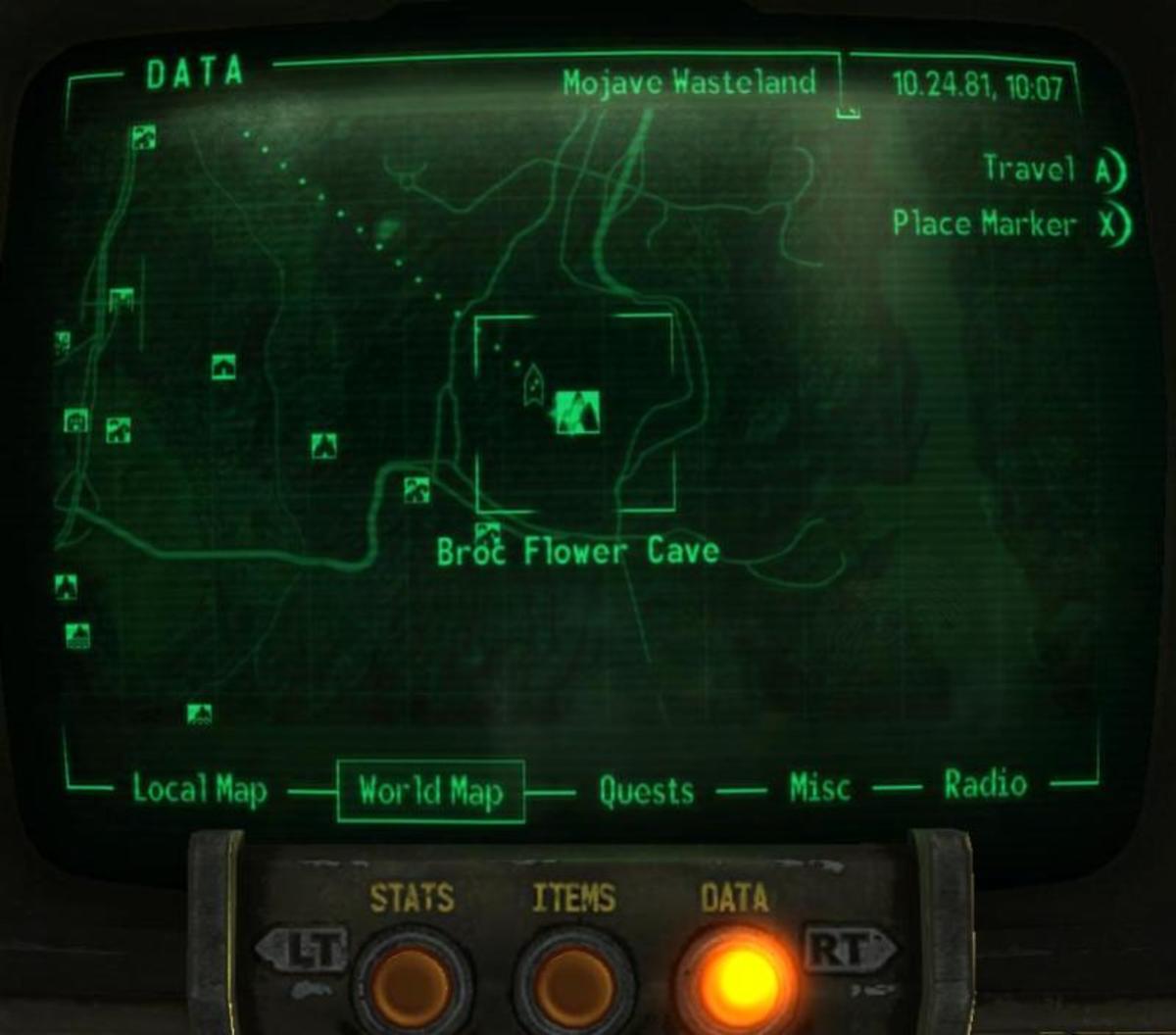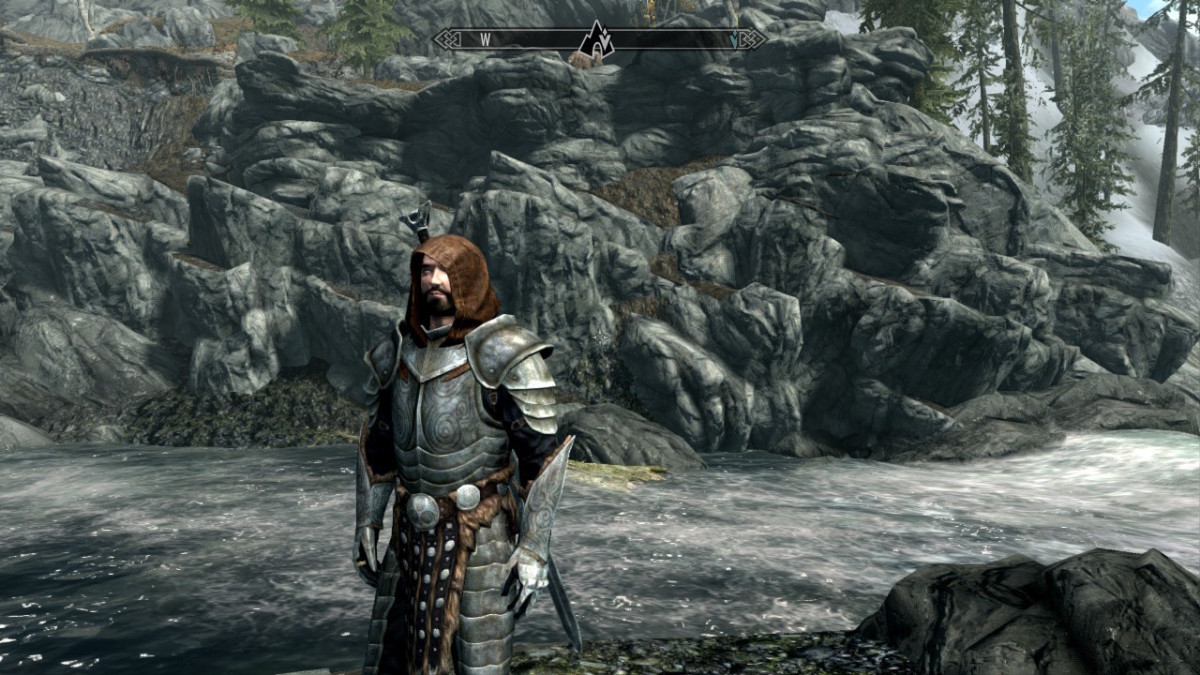Kingdoms of Amalur: Reckoning, Character Skills
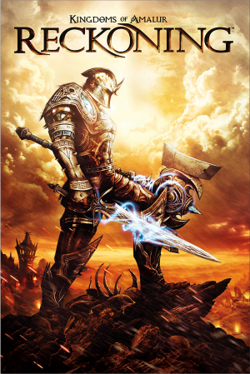
The Reckoning
When Kingdoms of Amalur: Reckoning went live in February of 2012, it didn't quite revolutionize the RPG combat and character progression as it intended. Still, it proved that RPG combat could be engaging and reactive, rather than a pause-and-plan affair, and they presented a progression system that introduced real flexibility alongside archetypal class concepts. And the game wasn't even that bad. But with 38 Studios now defunct and EA looking to sell the franchise, Reckoning will soon disappear into the ether of gaming history. Thus, now's the perfect time to grab a copy for cheap and test it yourself.
To get you started, here's my personal guide to skills in Reckoning.
Mad Skillz
If you've played Dragon Age: Origins, the skill system in Reckoning should be familiar. Each of the nine skills has ten ranks. Each rank increases a value associated with the skill, and certain ranks also possess milestones, which confer additional bonuses or abilities. If you want to use a skill effectively, you can acquire skill ranks in four ways:
- Each race has a permanent bonus to three skills: one bonus of +2, two bonuses of +1.
- Each level-up presents you one skill point to allocate to a new skill rank.
- Each skill has one skill book located within the world that bestows a +1 permanent bonus to the related skill.
- Each skill has trainers located throughout the world: two basic trainers for ranks 1-3, one advanced trainer for ranks 4-6, and one master trainer for ranks 7-9. For a fee, each trainer will bestow a permanent +1 bonus to the related skill. Beware, each trainer only works once and only if you're within his range of training.
And, that's it. It's a simple system. The trick is knowing in which skills to invest and when. There's no absolute rule, and there's not even that much agreement on which skills are great and which are useless. But, I'll explain why a skill might be useful to you, when you should get it, and how many ranks you should acquire.
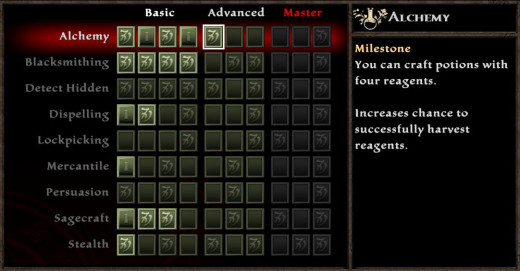
Alchemy
For the Herbal Amalurian, alchemy is a way of life. With alchemy, reagents are harvested and combined to create potions that restore health, regenerate magic, improve skills, and more. For the player, it's a reasonable investment, to a point.
In the early hours, you'll loot all the potions you need. Once you notice potions helping less or running out, consider the first three ranks of alchemy. With them, you'll have enough chance to harvest the basic reagents, and you'll be able to combine three reagents for improved potions to supplement what you loot. That should suffice for much of the game.
If, however, you reach a point where rank three potions aren't sufficient or you're simply fond of more tactical potions, then consider rank four and five. With them, you'll have access to the most powerful potions in the game. Beyond that, don't worry about Alchemy. The additional ranks will improve your collecting but only just, and the rank ten milestone is useless, unless you have a strong aversion to online guides.
Blacksmithing
Blacksmithing has long been the trade of martial warriors, but now, it also assists sorcerers with the crafting of magical weapons and robes. Seriously. Whether you're going might, finesse, or sorcery, blacksmithing works, if you're willing to work for it. And work it is.
The first two ranks of blacksmithing are solid investments, even early in the game. With those ranks, you can salvage white gear for components to craft green gear; so junk gear can be improved and then sold for greater profit. That's the real value of Blacksmithing: reforging junk for greater profit.
Rank three to rank six is just an issue of matching your needs. If you're finding lots of greens or want special effects, get rank three. If you're needing slightly stronger or more versatile gear, get rank four. When you're finding lots of blues (rares), buy rank five and six. And, if you're also improving sagecraft, rank seven can be a game changer. After that, it's a dash to rank ten, which makes all your crafted gear much better.
Beware, Blacksmithing isn't for the faint of gaming. It's real work. Salvaging involves a lot of randomness and requires a lot of patience, sometimes without any real reward. And, the best gear involves a tedious, tenuous cycle of craft, salvage, recraft, re-salvage, and so on. Without question, Blacksmithing is the most complicated of the crafting skills, but the rewards are paramount for any player. If you work for it.
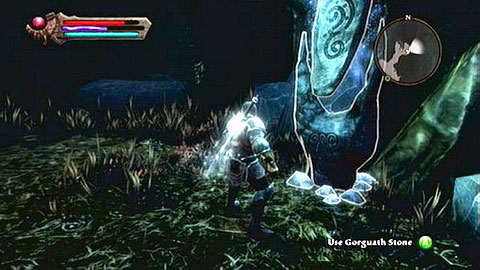
Detect Hidden
Detect Hidden improves the character's awareness of the environment and magical sensitivity. Or something like that. Basically, it allows you to acquire more gold and access restricted areas. That might sound great, but don't get excited. There are better options.
If you're hurting for gold, you could take the first and second rank. With them, you'll loot slightly more gold, you'll notice enemies on your mini-map, and you'll discover hidden chests (in logs?). If you're investing in Stealth, get rank three so you can determine your target's facing. After that, Detect Hidden is mostly irrelevant.
Ranks 4, 7, and 8 deal with traps, but most traps can be avoided or detonated, so they're not so useful. Rank 5 provides access to secret rooms, similar to the chests of Rank 2, which is great towards the end of the game but only then. Rank 10 reveals the location of all the lore stones, just like an online guide can, so why bother investing. If you must invest, do so sparingly.
Dispelling
Dispelling is the magical equivalent of Lockpicking. Unlike Lockpicking, though, Dispelling can be very difficult and requires more reflex than patience. Dispelling is also less frequent than Lockpicking. But, since anyone could use the loot gained from Dispelling a chest, it's a reasonable skill for all players.
After you've had your first frustrating failure with Dispelling, start working towards the first and second rank. With them, you'll have an easier time of Dispelling, and the ward (the magical lock) won't explode 'til your second failure. As you progress and face more difficult wards, purchase the third and fourth ranks, further increasing your Dispelling prowess and eliminating rueful dark sigils.
After that, the milestones, although helpful, are less significant, so the real reason for further investment is automatically improving your Dispelling ability. But, with a bit of practice and rigorous saving/loading, you shouldn't need the final few ranks 'til the latter parts of the game.
Lockpicking
Didn't we just cover this? Oh, right, this is Lockpicking, not Dispelling. Well, it's definitely useful for all players because everyone will encounter locked chests and such. But, it's use is limited.
The mini-game for Lockpicking requires patience and not much else. Yeah, each rank of Lockpicking means faster success, and the milestones at 4, 7, 8, and 10 mean instant success for each level of difficulty. And that's great, really. It's just not imperative, especially not early, when the locks are easy to pick. Even if you do have difficulty with Lockpicking, saving/loading is an easy to way to conserve lockpicks, which can be purchased anyway.
Lockpicking just isn't a priority, especially not compared to Dispelling. When you find yourself struggling with locks towards the end-game or aren't sure where to allocate a rank, go for Lockpicking but only then.
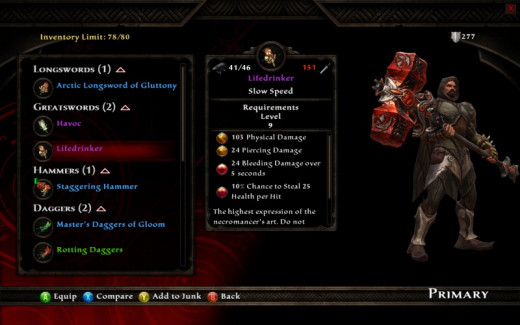
Mercantile
Do you like money? Well, Mercantile is just the skill for you. With each rank of Mercantile, the player barters better at shops: selling higher, buying lower. And that's...pretty much it.
The milestones at rank three and six restore a percentage of destroyed item's value, which is mostly useful for pack-rats, who aren't inclined to destroy items anyway. The rank ten milestone helps with selling stolen goods but can be circumvented with The Travelers. Really, the reason to invest in Mercantile is for the better bartering.
Although Mercantile relies on your adventuring and other skills to actually acquire items, it is best suited to making gold, which is critical in the early stages. So, as soon as you're sure you can survive most battles, buy the first two ranks, and the next two when you think you can afford the investment. After that, Mercantile loses priority to adventuring and crafting related skills, so wait until later in the game or when you're finding yourself low on gold.
Persuasion
Each rank of Persuasion improves the player's ability to persuade an NPC within dialogue. Since Persuasion is all dialogue and no mini-game, those ranks are critical to succeeding. Or so you might think.
I've succeeded with a paltry 12% and failed with a grand 83%, often, on both counts. I'm not saying the higher your chance, the more likely you are to fail, just that the increased chance is irrelevant because you still have a fair chance even without ranks. Plus, saving/loading can always give you another chance, which means, with just a bit of patience, you can achieve success. That is, if you even care about the story enough to bother persuading people, which I really didn't.
The milestones at rank 1, 3, 6, and 10 reduce bribe costs for noticed crimes. So, unless you're a lousy thief and unwilling to run from guards, these are useless.
If you're really loving the story, invest in here with the same rules I mentioned about Lockpicking, investing only when you're unsure where to go. Otherwise, don't even bother.
Sagecraft
Sagecraft focuses on crafting magical gems that imbue items with special properties, allowing for versatility and specialization. Materia, anyone? Ahem, since gems can benefit any player, Sagecraft is reasonable for everyone. Reasonable, but tricky.
Each rank of Sagecraft increases your chance of looting shards that create gems used for enhancing items. So, the earlier you invest and the more ranks you buy, the more gems you can craft. However, those gems don't make much impact until the later stages of the game. So, from a crafting perspective, you need to carefully balance your investment. Investing too soon makes the early and middle game very difficult. Investing too late makes the end game less fulfilling.
I recommend investing early but not deeply. You might have fewer shards at the end, but that just requires more calculated crafting, and more importantly, you'll have reached the end. If you're into Blacksmithing, you might consider going more heavily into Sagecraft for the extra shards. If you're not the least interested in crafting the gems, Sagecraft is still a viable skill for early income because the shards you discover and improve can sell for a lot of gold.
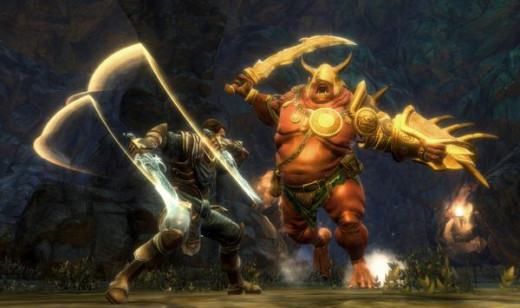
Stealth
In some games, players of all types benefit from a stealthy approach, whether the warrior trying to position himself for the first hit or the sorcerer trying to avoid unnecessary combat. Reckoning is not such a game.
In most situations, rushing the enemy with greatsword swinging, arrow flying, or spell slinging works just fine and might even save you some time. Plus, the primary benefit of Stealth is the stealth kill, which requires a Finesse player who's allotted points to Assassin's Art and Daggers/Faeblades. So, unless you fit that description, Stealth is entirely useless. Even if you do fit that description, Stealth isn't that great.
True, with all ten ranks and sufficient talent allotment, a Finesse player can deliver amazing damage. For a particularly patient player, the first two or three ranks might even be worth an early investment. But, that's it. Even when sneaking is an option, which isn't often, it just isn't that effective, so Stealth isn't a priority, not even for the Finesse player.
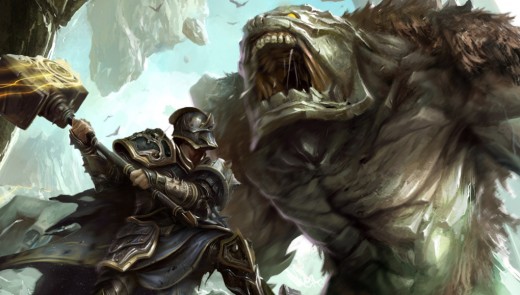
A Second Opinion
For some alternative theories on skills, consider Sebastian Haley's guide on Venture Beat or the Skill Breakdown found on the Amalur Foundry. The method for obtaining 89 skill ranks is also explained there, at the Foundry; my version's just more streamlined. And, if you want more information on skills, like trainer or book locations, check the Amalur Wiki page.
Weave It, Yo
So, there's my guide to investing in skills. Of course, that's not what you really want, to pick and choose which skills you want while forsaking possible interests. No, no one wants that. We want to have all the skills, to walk about the fields of Amalur like Odin through Midgar or Stan Lee through Comicon. Well, if you follow this method, you'll acquire 89 of 90 available ranks, nearly all of them. To do that, just ask yourself which rank of a skill you have right now.
- Rank 0 or 1: Pay the basic trainer, read the book, or use your point.
- Rank 2 or 3: Pay the basic trainer. If used, read the book, or use your point.
- Rank 4 or 5: Pay the advanced trainer, read the book, or use your point.
- Rank 6: Pay the advanced trainer. If used, read the book, or use your point.
- Rank 7: Pay the master trainer, read the book, or use your point.
- Rank 8: Pay the master trainer. If used, read the book or use your point.
- Rank 9: With no remaining trainer, read the book. If used, then use your point.
That's it. This method works regardless of chosen race for all players and without convoluted fateweaving. The linchpin is using every available trainer -- both basics, the advanced, and the master -- for all skills. Even if you allocate points for a skill, you can always fateweave later to redistribute points, putting you back within the skill range of an unused trainer. It's that easy.
And there's the whole of it. Hope you enjoy, and feel free to post comments below, let me know what your favorite skills were and when you found them useful.

